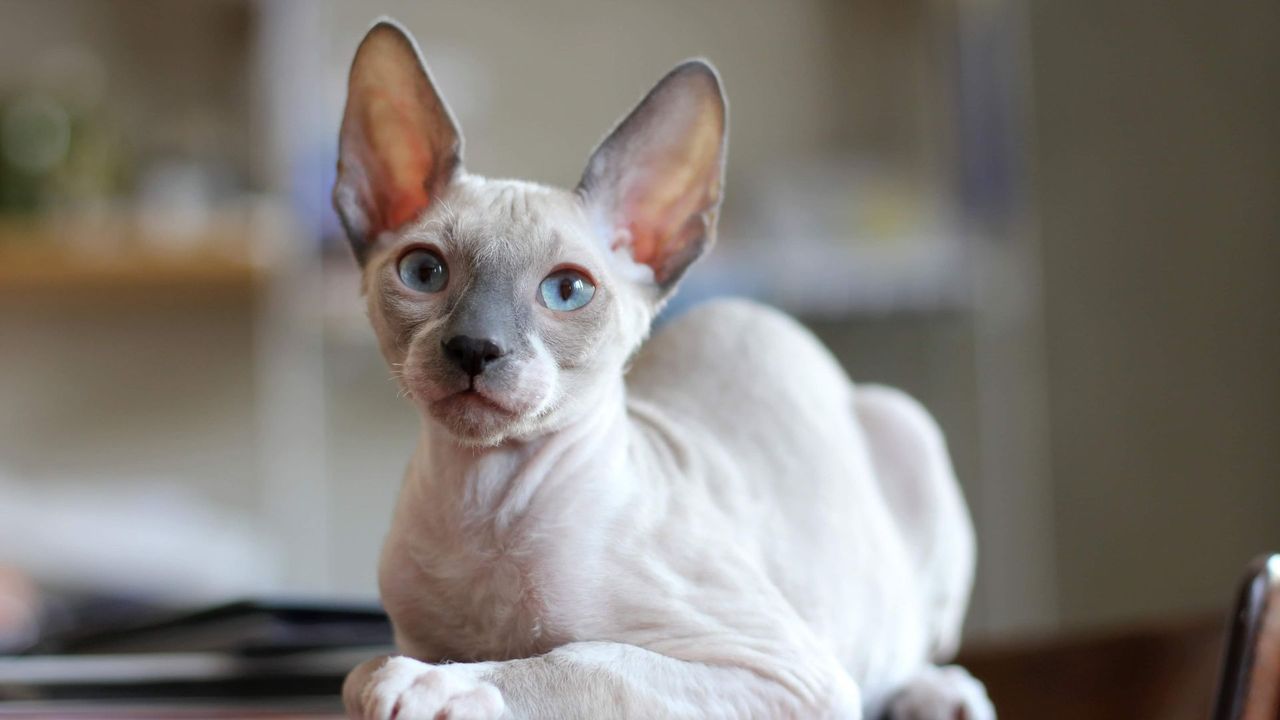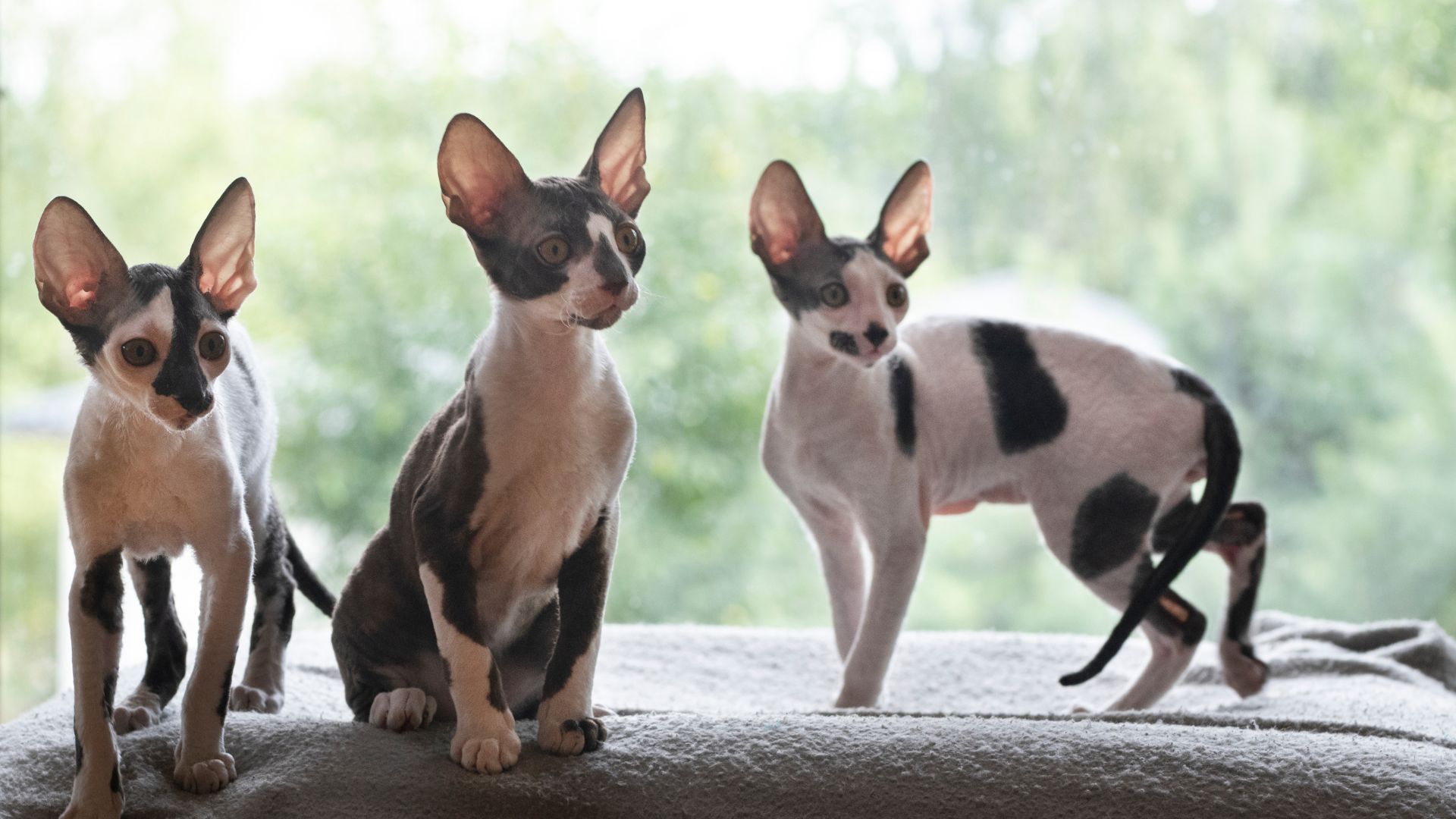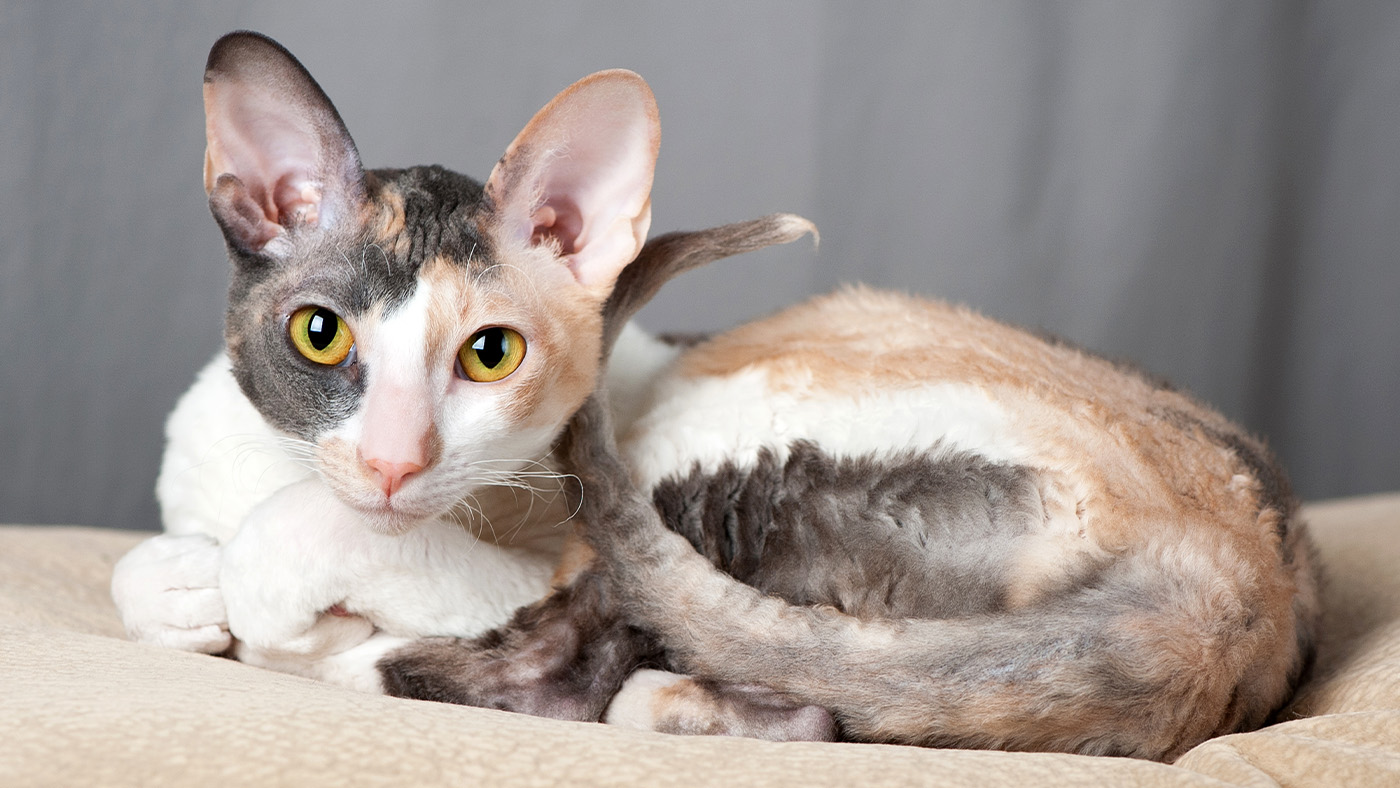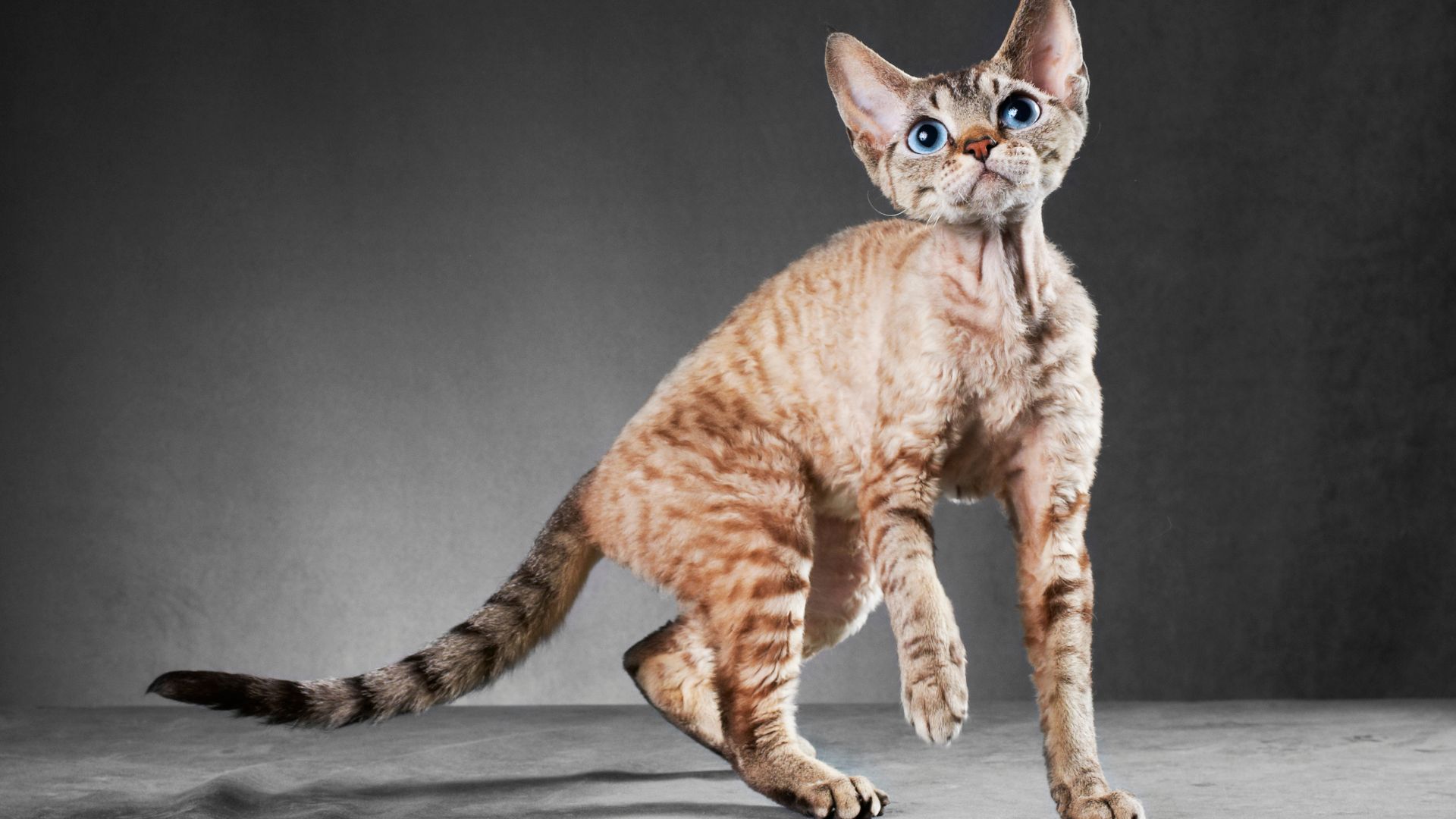

Other names: Rex, Corny, Cornies
Life expectancy: 15–20 years
Size: 8–12 inches (height), 12–17 inches (length) and 5–10 lbs
Coat: solid, bicolor, calico, tabby, smoke, pointed or tortoiseshell
Eye colour: green, gold, hazel, blue or odd-eyed
Temperament: curious, friendly, playful and sociable
Origin/native country: England, UK
Long-living? Tick. Hypoallergenic? Tick. Great for families? Tick. The Cornish Rex cat checks a lot of boxes when it comes to fur friends you want to welcome into your home—so it’s no wonder that the Cornish Rex is classed as one of the most popular cat breeds.
This clever pedigree is like a long-lasting battery as they are filled with kitten-like energy, even when they’re fully grown adults, and they’ll keep you entertained with their tricks as they thrive on learning, playing and receiving attention.
Well known and loved for its bat-like ears, clown-like behavior and athletic ability, the Cornish Rex breed came about after a spontaneous genetic mutation in 1950 when a kitten named Kallibunker was born with a unique curly coat.
Whether you’re thinking of adopting a Cornish Rex or you’re just keen to find out more about this fascinating breed (and who can blame you?), we spoke to Dr Rebecca MacMillan, who shared everything there is to know about a Cornish Rex's, health, exercise needs and more.
Are Cornish Rex cats hypoallergenic?
Due to their short curly hair, which sheds minimal amounts, the Cornish Rex is considered to be a hypoallergenic cat breed.
That said, in the cat kingdom, no kitty can ever truly be hypoallergenic, Dr MacMillan explains.
“Bear in mind that hypoallergenic just means less allergenic, not completely allergen-free. These cats still produce the Fel d1 protein in their urine and saliva, which is what triggers reactions in sufferers.”
This happens when saliva gets spread through the coat as the cat grooms itself, and these proteins are shed into the environment by any loose hairs.
“So, some sensitive allergy sufferers will still react to a Cornish Rex,” the vet adds.
Do Cornish Rex cats shed?
Cornish Rex cats shed, but they do so very minimally. So technically speaking, they are classed as being a non-shedding cat—and it’s all down to their unique coat.
Generally speaking, most cats tend to have two coats. This includes an undercoat and an outer layer of much coarser hairs. However, Cornish Rex cats only have a soft and curly undercoat, which means they are less likely to shed when compared to other breeds.

How does a Cornish Rex differ from a Devon Rex?
If you’ve heard of a Cornish Rex, you’ve probably come across their other well-known counterpart, the Devon Rex, which hails from the same county in south-west England.
Along with their similarly sounding names, they share a few other similarities and differences.
“Both cats have a short curly or wavy coat, but the Cornish Rex’s is a little finer and silkier,” explains Dr MacMillan. “Both are minimal shedders with low-maintenance grooming needs.”
Size-wise, the Cornish Rex is the bigger of the two, weighing an average of 6–12 pounds, whereas the Devon Rex is usually 4–9 pounds.
The Cornish Rex also has a slightly longer average lifespan, living between 15–20 years, while a Devon Rex has a life expectancy of 12–16 years.
“Looks-wise, the Devon Rex has characteristically large, rounded ears and a broad head, whereas the Cornish Rex’s features are a bit more refined,” Dr MacMillan highlights. “Both cats are sweet-natured and enjoy human company.”
How much grooming does a Cornish Rex cat need?
Grooming-wise, Cornish Rex cats are low-maintenance as they are considered to be one of the non-shedding cat breeds that don’t shed too much.
That being the case, “weekly brushing should be enough for these cats, with a soft brush or grooming mitten, as well as regular teeth brushing,” explains Dr MacMillian.
How much exercise does a Cornish Rex cat need?
What a Cornish Rex may lack on the grooming front, they will more than make up for in their need for play.
“These cats are energetic and maintain a kitten-like enthusiasm for play,” Dr MacMillan says. “They also like climbing!”.
Therefore, Dr MacMillan says a Cornish Rex will need at least 30 minutes of physical activity each day, with some needing a bit more.
The good news is that Cornish Rex cats often enjoy entertaining themselves. So if you’re unable to devote 30 minutes of time to play, the best interactive cat toys and best automated cat toys will help keep them occupied.
Due to this breed’s love for climbing, it could also be beneficial to invest in one of the best cat trees or best cat hammocks, so they can watch over their cat kingdom from up high.
Cornish Rex health problems
The Cornish Rex is prone to hypertrophic cardiomyopathy (HCM), which is found in many pedigree cats.
“This hereditary heart condition causes thickening of the muscular heart walls affecting the amount of blood that can be moved around the body each time the heart pumps,” Dr MacMillan explains. “This can also lead to issues like the formation of blood clots and sudden death.”
Another hereditary complaint this breed can suffer from is polycystic kidney disease, which is one of the most common illnesses in cats.
“These cysts are present from birth and will gradually increase over time affecting the ability of the kidneys to function properly,” Dr MacMillan highlights. “This may lead to kidney failure in some cases.”
Unfortunately, neither of these conditions is curable. So Dr MacMillan says potential owners should take steps to purchase their kitten from a reputable breeder.
“A good breeder will have carried out health screens and should only mate healthy cats,” the expert adds.
If you adopt a Cornish Rex that is born completely white, it can also suffer from a genetic mutation for deafness and according to Dr MacMillan, the risk of this increases if they also have blue eyes.
“This breed also seems prone to tartar buildup and dental disease, so owners should implement oral care from a young age,” the vet says. “I find that cats will tolerate tooth brushing if it is introduced gradually and with lots of positive reinforcement.”

How much does a Cornish Rex cost?
It’s hard to say exactly how much a Cornish Rex will cost because how much you pay will depend on the breeder, state and health of your kitten.
Broadly speaking, a Cornish Rex kitten could cost anywhere between $800–1,500, which makes this breed much (much) more affordable than a Devon Rex, which can cost up to $3,000!
This puts a Cornish Rex in the same price bracket as a Burmese, ragdoll and Scottish Fold.
But if you decide to adopt a Cornish Rex, prices will be much lower, at around $100–300.
Should I get a Cornish Rex?
Above all, a Cornish Rex is a highly adaptable cat, so it would suit many owners and families.
“Their friendly nature means they love the company of people, whether that’s playing or just relaxing on a lap,” Dr MacMillan confirms. “But, because they enjoy companionship so much, they are best suited to households where there is someone around for most of the day.”
If left to their own devices too much, a Cornish Rex can become bored or destructive when not given enough attention.
Seeing as they are low-shedding, this breed of cat would also suit an owner who wants minimal cat hair in their home or is perhaps allergy-prone.
Lastly, Cornish Rex cats are temperature sensitive, which means they can get colder more easily than other cats, which means they are best suited to an indoor environment, Dr MacMillan highlights.
Read next: Facts about Cornish Rex cats
Edited by Georgia Guerin.






